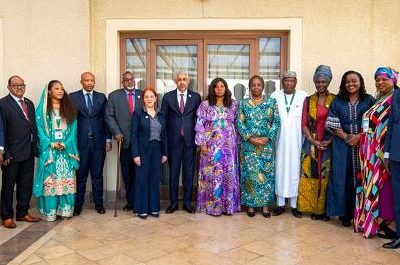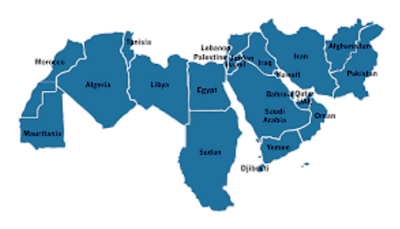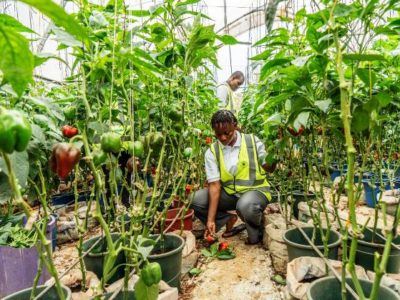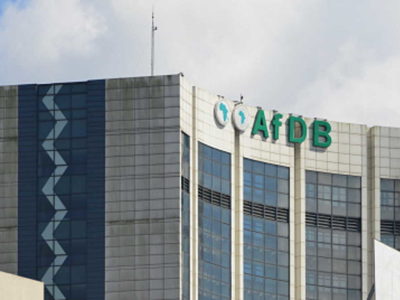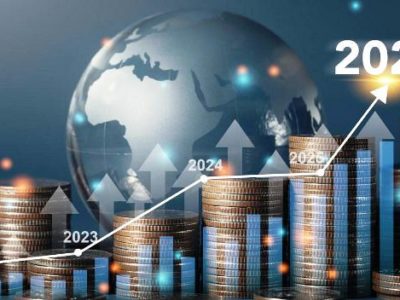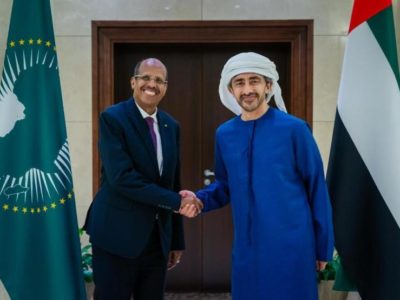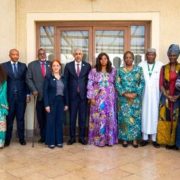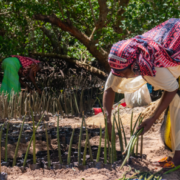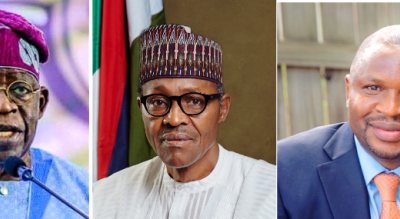- A significant strategic project with strong substantial economic and social impacts, the recently inaugurated solar photovoltaic plant in Jambur is poised to supply electricity to approximately 18,500 households. This power plant supported by The Government of The Gambia and its development partners is part of a wider initiative aimed at enhancing the contribution of renewable energy within the electricity sector.
- Similar to this project, another strategic initiative, the Gambia Sustainable Energy Project (GSEP) within the Gambia Renewable Energy Programme, – which aims to provide clean, sustainable, and environmentally friendly energy to 1000 schools and 100 health facilities in rural areas of The Gambia currently lacking access to electricity – would also benefit significantly from this endeavor.
- The project reduces the unemployment rate in The Gambia with 1,250 direct jobs created from the construction phase to operation and maintenance.
- This project is part of the government’s Renewable Energy Programme with strong support from the European Investment Bank, the European Union and the World Bank.
The Government of The Gambia, through the Ministry of Petroleum and Energy and The National Water and Electricity Company (NAWEC), along with the European Investment Bank, the European Union, and the World Bank, has recently inaugurated a new milestone in the Gambia Electricity Restoration and Modernization Project (GERMP).
The Inauguration Ceremony, which was presided over by His Excellency Adama Barrow, the President of the Republic of The Gambia, celebrated the completion of a 23 MWp Photovoltaic Solar plant in Jambur, Kombo South District, West Coast Region.
This project component consists in the construction of a new 23 MWp solar park tied with 8MWh battery storage and aims to revolutionize power generation in the Gambia by serving as a direct complement to current generation sources while decreasing the dependence on import. These investments are all inherently tied to the Gambia’s Energy Sector Roadmap 2021-40.
A project with a strong economic and social impact
GERMP contributes to improving the livelihoods of populations within beneficiary communities, promoting job creation, and facilitating the provision of quality medical, educational and social services through better electricity supply. These improvements will contribute to the national objective of reducing poverty and boosting prosperity.
Now that it is operational, the project will progressively increase energy supply in The Gambia by a fifth and transform access to electricity in rural communities. The project will improve access to energy, ensure that education and health services benefit from reliable energy and help address electricity shortages in the country.
Energy demand in The Gambia has increased by 5.5% per year in recent years and today’s connection of the new 23 MWp solar plant to the national energy grid will significantly increase Gambia’s current generation capacity of 98 MW and enable electrification of rural areas.
A strong commitment
The European Union, the European Investment Bank and the World Bank have been strong partners of African countries for more than half a century. This project further strengthens their presence in Africa with strong collaboration between institutions. Over the past decade, the European Union, the European Investment Bank and the World Bank have invested in innovative technologies, green energy, water, education, agriculture, telecommunications, health and business in more than 40 countries on the continent.
In the context of this project, solar power and clean energy supply across the country is financed by the European Investment Bank (EUR 65m), the European Union (EUR 40m) and the World Bank (EUR 36m).
“As this is a utility scale solar PV plant, we have designed it to significantly reduce the country’s reliance on imported fossil fuel for electricity generation. In the same vein, the project is to accelerate the pace towards generating fifty (50) percent of the nation’s power supply from renewable energy sources by 2030. This is our national target, and the message is clear: as a responsible member of the international community, The Gambia is committed to the global energy transition. The Plant project clearly demonstrates the country’s commitment to reducing the carbon footprint and greening our energy landscape. Further to this, as a clean energy source and a major vehicle for climate change mitigation, the solar plant will contribute to the realisation of The Gambia’s Nationally Determined Contributions,” said President Barrow.
“The significance of this solar plant cannot be overemphasized. It symbolizes our unwavering commitment to driving change and pioneering progress in The Gambia’s transition towards a clean and sustainable energy future. By harnessing the power of the sun to produce 23MW of clean energy, we are not only reducing greenhouse gas emissions but also contributing to environmental protection and safeguarding the well-being of future generations. Moreover, the inauguration of this solar plant marks a crucial milestone in our quest for energy security. By diversifying our energy mix and reducing our dependence on fossil fuels, we are enhancing our energy independence and fortifying the stability and reliability of The Gambia’s power supply system,” said Mr. Nani Juwara, Managing Director at NAWEC.
“I am delighted that the European Investment Bank is supporting this new solar plan with such economic and social impact for populations in Gambia, particularly in rural areas. It will have a positive impact on people’s daily lives of over 800,000 inhabitants in improving also medical, educational and social services through better electricity supply. This project also contributes to developing green energy while decreasing the dependence on import. It is a very good illustration of the priorities of the EIB as the EU Climate Bank, which supports clean energy investments in Africa.” He added: “With EIB Global, our branch dedicated to development, our objective is to finance high-impact projects outside the EU while strengthening our partnerships. Our ambition is to support the EU’s Global Gateway Initiative and key sectors in countries across the African continent such as innovation, renewable energy, water, agriculture, and transport,” said Mr. Ambroise Fayolle, Vice-President at the European Investment Bank (EIB).
“This power plant is part of the “Gambia Electricity Restoration and Modernization Project” and it is particularly important for the achievement of a swift transition towards solar power and clean energy supply across the country. Increased access to green energy is only one of the benefits of the project. We expect 1,250 direct jobs linked to the construction, operation and maintenance. The Gambia Electricity Restoration and Modernization Project is backed by significant funding from the European Investment Bank (EUR 65m – which corresponds to more than 8.9 billion dalasi), from the European Union (EUR 40m – almost 3 billion dalasi) and from the World Bank (EUR 36m – almost 2.7 billion dalasi). The EU support is part of the EU Global Gateway, which is an ambitious initiative aimed at fostering collaboration and connectivity between Europe and Africa. Through Global Gateway, the EU supports investments in quality infrastructure, respecting the highest social and environmental standards, in line with the EU’s values and international norms and standards. Green energy is a key priority area under the Global Gateway. The Ambassador concluded by saying that “I would like to re-affirm here, today, the commitment of the European Union to support The Gambia to ensure a bright and prosperous future for its people. Reliable access to energy is an indispensable element to realise this vision,” said H.E. Corrado Pampaloni, Ambassador of the European Union to The Gambia.
“The World Bank is pleased to join The Government of The Gambia to witness this remarkable milestone in the Energy Sector. This marks the first time in the Gambia’s history where a utility scale solar plant of 23 Megawatts Solar PV capacity and 8-Megawatt hours battery storage is being commissioned. This solar plant allows NAWEC to finally shift away from expensive heavy fuel oil-based generation which is costly and harmful to the environment. The vision of universal access to energy is being supported by the World Bank through the development of medium and low voltage networks across The Gambia. Through the bank financed GERMP and ECOWAS Regional Electricity Access Projects, over 700 communities will be provided electricity for the first time in the country’s history. These are significant historic milestones for The Gambia. There are also plans underway to develop the country’s potential to become an electricity exporter to the sub-region through the development of a 150MW solar park in Soma,” said Feyi Boroffice, Resident Representative of the World Bank to The Gambia.


